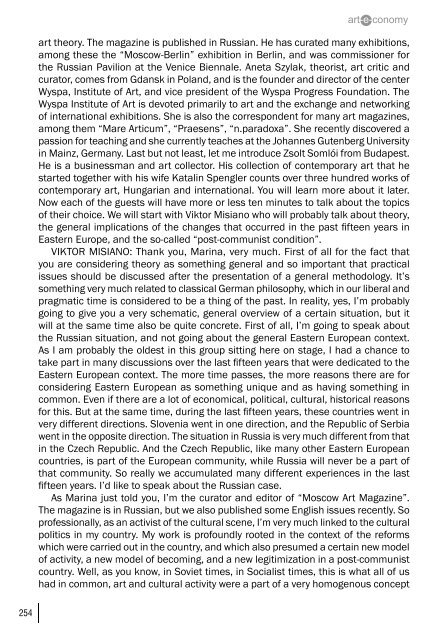art-e-conomy _ reader - marko stamenkovic
art-e-conomy _ reader - marko stamenkovic
art-e-conomy _ reader - marko stamenkovic
You also want an ePaper? Increase the reach of your titles
YUMPU automatically turns print PDFs into web optimized ePapers that Google loves.
254<br />
<strong>art</strong> theory. The magazine is published in Russian. He has curated many exhibitions,<br />
among these the “Moscow-Berlin” exhibition in Berlin, and was commissioner for<br />
the Russian Pavilion at the Venice Biennale. Aneta Szylak, theorist, <strong>art</strong> critic and<br />
curator, comes from Gdansk in Poland, and is the founder and director of the center<br />
Wyspa, Institute of Art, and vice president of the Wyspa Progress Foundation. The<br />
Wyspa Institute of Art is devoted primarily to <strong>art</strong> and the exchange and networking<br />
of international exhibitions. She is also the correspondent for many <strong>art</strong> magazines,<br />
among them “Mare Articum”, “Praesens”, “n.paradoxa”. She recently discovered a<br />
passion for teaching and she currently teaches at the Johannes Gutenberg University<br />
in Mainz, Germany. Last but not least, let me introduce Zsolt Somlói from Budapest.<br />
He is a businessman and <strong>art</strong> collector. His collection of contemporary <strong>art</strong> that he<br />
st<strong>art</strong>ed together with his wife Katalin Spengler counts over three hundred works of<br />
contemporary <strong>art</strong>, Hungarian and international. You will learn more about it later.<br />
Now each of the guests will have more or less ten minutes to talk about the topics<br />
of their choice. We will st<strong>art</strong> with Viktor Misiano who will probably talk about theory,<br />
the general implications of the changes that occurred in the past fifteen years in<br />
Eastern Europe, and the so-called “post-communist condition”.<br />
VIKTOR MISIANO: Thank you, Marina, very much. First of all for the fact that<br />
you are considering theory as something general and so important that practical<br />
issues should be discussed after the presentation of a general methodology. It’s<br />
something very much related to classical German philosophy, which in our liberal and<br />
pragmatic time is considered to be a thing of the past. In reality, yes, I’m probably<br />
going to give you a very schematic, general overview of a certain situation, but it<br />
will at the same time also be quite concrete. First of all, I’m going to speak about<br />
the Russian situation, and not going about the general Eastern European context.<br />
As I am probably the oldest in this group sitting here on stage, I had a chance to<br />
take p<strong>art</strong> in many discussions over the last fifteen years that were dedicated to the<br />
Eastern European context. The more time passes, the more reasons there are for<br />
considering Eastern European as something unique and as having something in<br />
common. Even if there are a lot of economical, political, cultural, historical reasons<br />
for this. But at the same time, during the last fifteen years, these countries went in<br />
very different directions. Slovenia went in one direction, and the Republic of Serbia<br />
went in the opposite direction. The situation in Russia is very much different from that<br />
in the Czech Republic. And the Czech Republic, like many other Eastern European<br />
countries, is p<strong>art</strong> of the European community, while Russia will never be a p<strong>art</strong> of<br />
that community. So really we accumulated many different experiences in the last<br />
fifteen years. I’d like to speak about the Russian case.<br />
As Marina just told you, I’m the curator and editor of “Moscow Art Magazine”.<br />
The magazine is in Russian, but we also published some English issues recently. So<br />
professionally, as an activist of the cultural scene, I’m very much linked to the cultural<br />
politics in my country. My work is profoundly rooted in the context of the reforms<br />
which were carried out in the country, and which also presumed a certain new model<br />
of activity, a new model of becoming, and a new legitimization in a post-communist<br />
country. Well, as you know, in Soviet times, in Socialist times, this is what all of us<br />
had in common, <strong>art</strong> and cultural activity were a p<strong>art</strong> of a very homogenous concept


